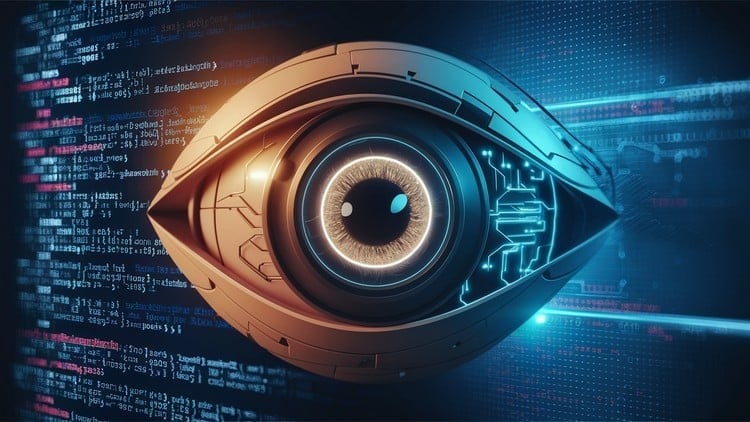
Master Computer Vision & Image Processing: OpenCV, Deep Learning, AI Applications & Real-World Projects
⭐ 3.72/5 rating
👥 1,412 students
🔄 October 2025 update
Add-On Information:
Note➛ Make sure your 𝐔𝐝𝐞𝐦𝐲 cart has only this course you're going to enroll it now, Remove all other courses from the 𝐔𝐝𝐞𝐦𝐲 cart before Enrolling!
- Course Overview
- This comprehensive certification program transforms aspiring professionals into proficient Computer Vision and Image Processing specialists.
- Embark on a transformative journey, demystifying visual data interpretation from foundational concepts to advanced deep learning applications.
- The curriculum provides a robust understanding of how machines perceive, process, and make decisions based on visual information, bridging theory with industry demands.
- Gain certified expertise leveraging powerful tools like OpenCV, integrating traditional image processing with cutting-edge deep learning architectures for real-world challenges.
- Through a project-centric approach, you will build a compelling portfolio demonstrating sophisticated computer vision solutions across various domains.
- Reflecting an October 2025 update, the content ensures your knowledge and skills are current and highly relevant in the rapidly evolving AI field.
- Requirements / Prerequisites
- Foundational Python Programming: A working knowledge of Python, including basic data structures, control flow, and object-oriented concepts, is essential.
- Basic Mathematics: Understanding fundamental linear algebra, calculus (derivatives), and probability/statistics aids in grasping algorithms and deep learning.
- Machine Learning Basics: Familiarity with core ML principles (supervised/unsupervised learning, model evaluation) provides beneficial context.
- Conceptual Aptitude: A curious mind and genuine interest in AI, image analysis, and solving complex problems with visual data are highly encouraged.
- Hardware & Software: Access to a personal computer capable of running development environments, potentially with GPU support for deep learning tasks.
- Skills Covered / Tools Used
- Core Image Processing: Master techniques for image acquisition, enhancement, filtering, morphological operations, geometric transformations, and color space manipulation.
- Feature Extraction & Description: Learn to identify and describe image features (e.g., SIFT, SURF, ORB, HOG) for recognition and matching tasks.
- Object Detection & Recognition: Implement deep learning models (CNNs, R-CNNs, YOLO, SSD) for accurate object localization and classification.
- Image Segmentation: Explore semantic and instance segmentation using architectures like U-Net and Mask R-CNN to precisely delineate objects.
- Video Analysis: Develop skills in motion estimation, object tracking (e.g., Kalman filters), and action recognition for dynamic visual data processing.
- Deep Learning Frameworks: Gain hands-on proficiency with TensorFlow, Keras, and PyTorch for neural network development and deployment.
- OpenCV Mastery: Become adept at utilizing the extensive functionalities of the OpenCV library for various computer vision tasks.
- Python Ecosystem: Leverage essential Python libraries like NumPy, Matplotlib, and scikit-image for numerical operations, visualization, and advanced processing.
- AI Model Deployment: Understand principles of optimizing and deploying computer vision models, including quantization and edge device considerations.
- Real-World Project Development: Acquire end-to-end skills to conceptualize, design, implement, and evaluate computer vision projects from scratch.
- Benefits / Outcomes
- Industry-Recognized Certification: Earn a valuable certification validating your expertise, enhancing professional credibility and career prospects.
- Robust Portfolio Development: Graduate with practical, real-world projects showcasing your ability to apply complex algorithms and deep learning.
- Career Advancement Opportunities: Position yourself for roles like Computer Vision Engineer, AI Developer, ML Engineer, or Image Processing Specialist.
- Problem-Solving Acumen: Develop a systematic approach to analyzing visual data problems, designing appropriate solutions, and evaluating performance.
- Hands-On Expertise: Gain practical experience with leading tools and frameworks, making you job-ready and capable of immediate project contribution.
- Deep Conceptual Understanding: Grasp the mathematical and algorithmic foundations behind various computer vision techniques, enabling innovation.
- PROS
- Comprehensive Curriculum: Covers both traditional image processing and modern deep learning for a holistic understanding.
- Hands-on Project Experience: Emphasizes practical application through real-world projects, building a strong portfolio.
- Up-to-Date Content: The October 2025 update ensures learning the latest algorithms, techniques, and industry best practices.
- Industry-Relevant Tools: Extensive training in OpenCV, TensorFlow, Keras, and Python prepares you for professional roles.
- Certification Value: A formal certification validates specialized skills, providing a competitive edge in the job market.
- CONS
- Demanding Learning Curve: Requires significant dedication, consistent effort, and a solid time commitment to fully grasp complex theoretical concepts and master practical implementations.
Learning Tracks: English,IT & Software,Other IT & Software
Found It Free? Share It Fast!